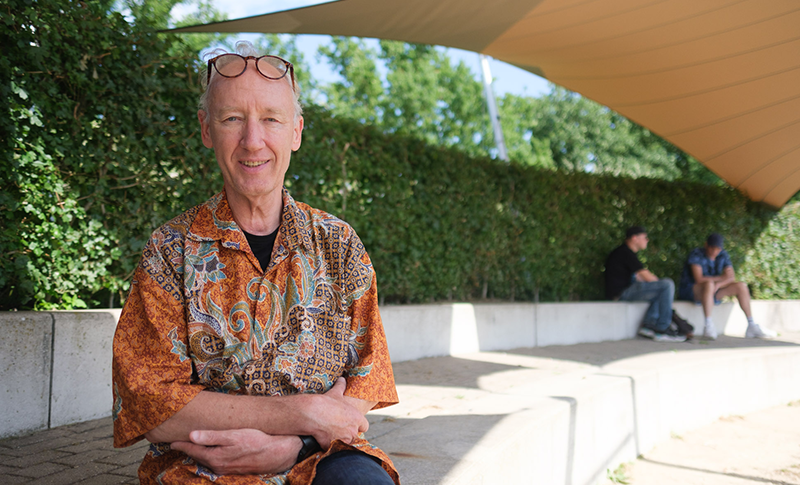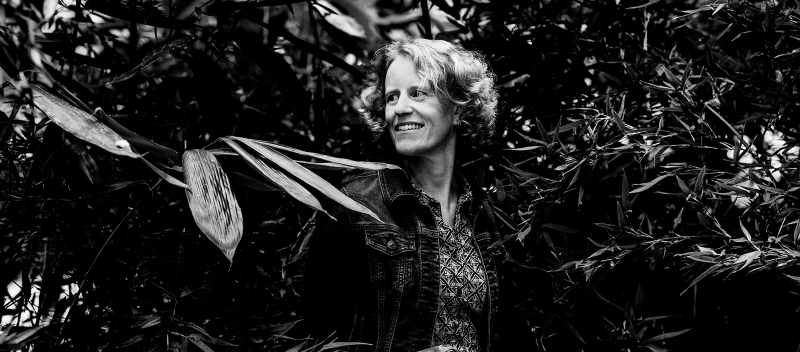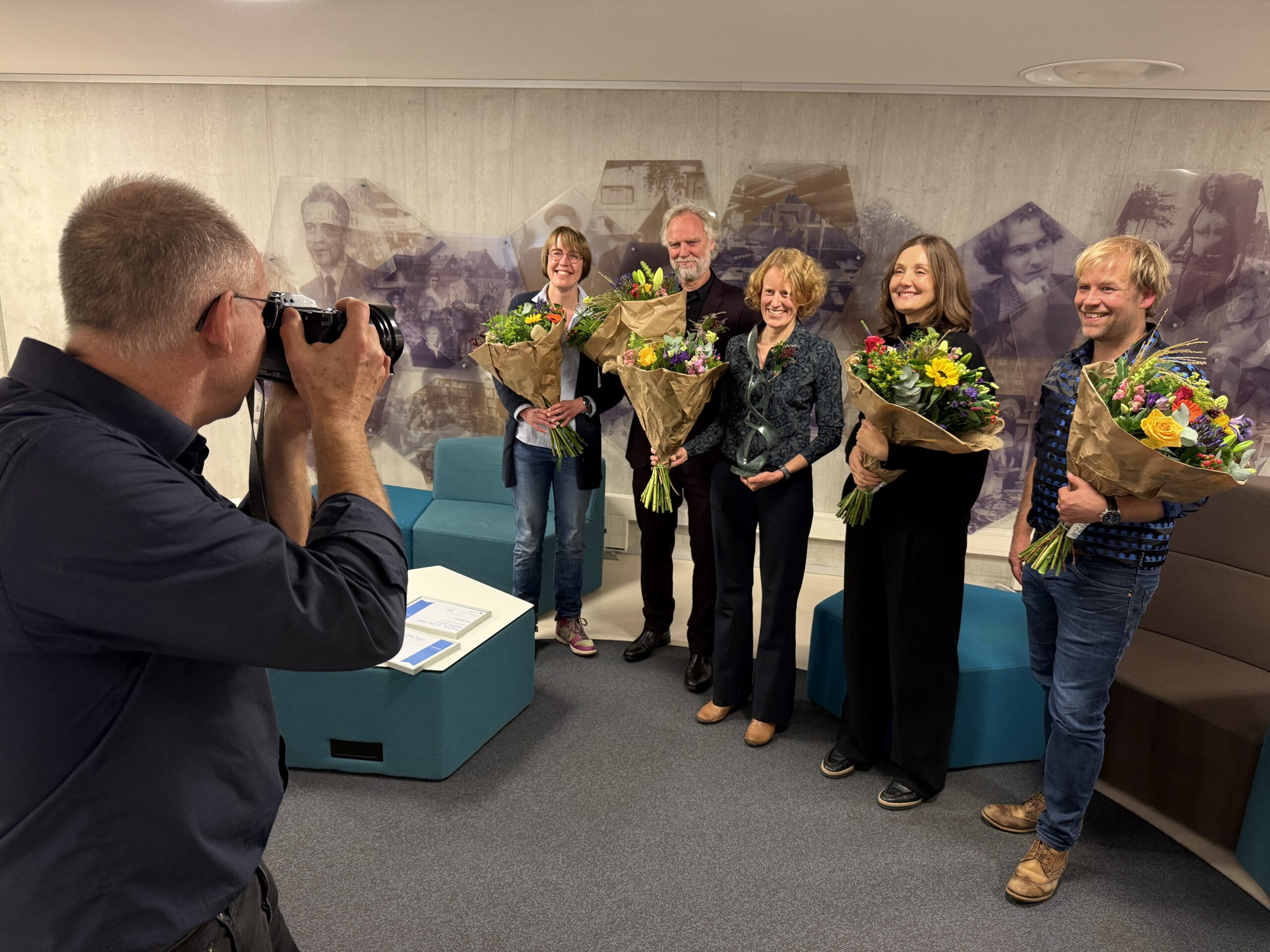Ignas Heitkönig was pronounced Teacher of the Year last June. Here, the assistant professor of Wildlife Ecology and Conservation talks about the importance of outdoor classes, taking cake to demonstrators blocking the A12, and a tramline to Ede.
I gather you’ve just been through a difficult period in your work?
‘During the pandemic I was asked if I would like to teach the Animal Ecology course. One of the learning goals on this course is to carry out animal experiments to test ecological processes. That is usually done with cows and sheep in the meadows, but that wasn’t possible at that time, so we decided to get the students working on snails. We had the snails delivered and handed them out on campus. In the snail arena, students conducted experiments looking at the snails’ eating habits, predator avoidance behaviour, and various other things. It all went well but it was massively time-consuming. Supervising students online, doing everything on Teams, improvising all the time – it sapped energy. By the time we’d finished that course, I was exhausted. I wasn’t even happy that it had all gone well, I was just relieved. I went off on holiday exhausted, and I came back exhausted. It took me an awful lot of energy to get back to work. I think I was on the brink of a burnout. Thanks to coaching from the occupational social work department, I made a pretty good recovery, but I am still having difficulty concentrating.
‘Incidentally, I couldn’t have taught the course at all without my colleague Janneke Troost: she organized the switch to online lectures quickly and amazingly well. That just goes to show that teaching is teamwork.’
You enjoy teaching outdoors.
‘We are all part of nature, but we seem to have forgotten that connection, including the connection with the food we eat. We have created a system in which the distance between us and food production is so vast that we can no longer see the whole picture. A very nice component of Reineke van Tol’s Wild Perspectives course is that we go for a long walk out in the countryside with someone who knows a lot about plants. He plays awareness-raising and networking games with the students, as well as telling them things like: you can eat the leaves of this plant like lettuce, or the roots of that plant look like carrots. Then the students harvest those plants. That makes you realize that food comes from nature, and how rich nature really is. To me, courses in which you spend time out in nature with the students are crucial.
‘We are a great university in that area, by the way. Take the BioBlitz, for example – an initiative launched two years ago by Liesje Mommer and Mieke de Wit. During the BioBlitz, everyone is invited to come to campus and see what plant and animal species can be found here. This year, over 1380 species were found – crazy! And now the BioBlitz has grown into a Europe-wide competition that a lot of universities and institutes take part in. It’s great fun to do, you learn a lot from it and you go home feeling happy. It brings you closer to nature. Such brilliant initiatives are what Wageningen excels at. In that respect, I am proud to work for a university like this one.’
So should we all be getting outdoors more?
‘I think that a little time out of doors could enrich every course. Just the change of scenery – so getting away from the laptop or out of the classroom, and standing in a field or at the edge of a pond – can provide inspiration or help make the material sink in properly. It adds something educationally as well as helping us to reconnect with nature. The other day, a teacher emailed me to say he did the statistics mock exam and course review outside on campus. His students were enthusiastic about it. That shows that even a course like statistics benefits from a bit of time out of doors. How easy and nice would it be to use TimeEdit to book an outdoor classroom for a workshop or a meeting?
‘The campus itself could be a lot more natural too, incidentally. Make it a connecting zone between the Veluwe and the Utrechtse Heuvelrug. Don’t be afraid to think big. It would mean a different mobility plan with far fewer cars. The province wants to boost mobility by widening the Mansholtlaan. But why don’t we collectively opt for – am I allowed a crazy suggestion? – a tramline? That idea was suggested by Like Fokkens at Scientists4Future. Lay two tracks, sow grass between them, surround them with trees and that’s it. The trams could come and go at regular intervals from morn till night. There’d be less exhaust fumes and you could narrow the Mansholtlaan, because you’d have made an easy, sustainable connection to Ede-Wageningen station. Encourage the mobility of the future, not that of the past.’
Text continues under the photo.
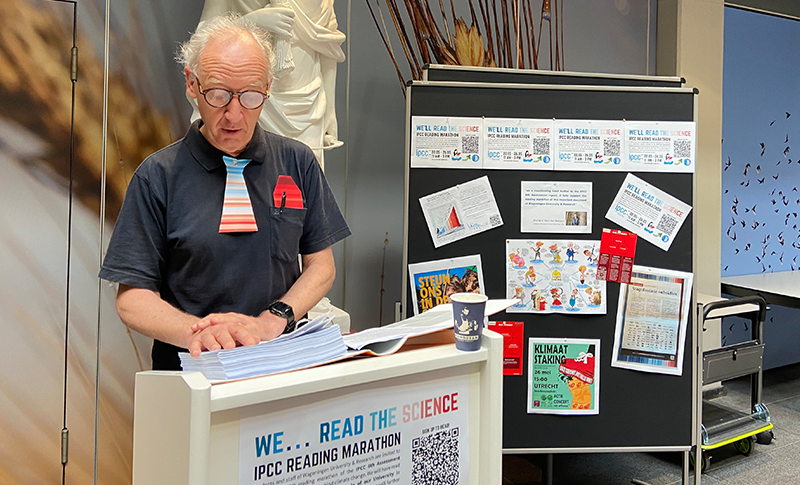
‘the most important report in decades’. Photo Susanne van Donk
The student jury lauded you for your authentic teaching, your love of nature and your activism. But do science and activism belong together, actually?
‘I can’t see why they would clash. In fact, I don’t understand how on earth a scientist can remain silent – having critically read the scientific literature, knowing what is going on and how inadequately we are acting on it. When it’s so urgent. Recently there was a week with seven consecutive days of the highest global temperatures in the last 100,000 years. Meanwhile, I hear that the demand for meat just goes on rising, while in other places there is hunger caused by drought and climate change. These problems are all interlinked. When I was a student, I wanted to go to developing countries to help make the world a better place. Nowadays, my aim is to try to save the world. The urgency has changed and is even increasing.
‘Fortunately, I am not the only one who sees this: members of Scientists4Future now include over 170 Wageningen researchers, staff, PhD students and students from various walks of life. More people sign up every week. That tells you something. There is a feeling that we might be able to achieve things together under this umbrella that we can’t manage alone. That’s what my activism is: bringing people together and keeping issues on the table.’
So you’re not blocking any motorways yet?
‘Not myself, but I did go to the A12 to cheer on the motorway demonstrators and hand out cake. I didn’t stay very long as I haven’t had any activism training yet. I have a great admiration for the activists and I can see myself doing it in future, once I have had the training. Not to be cool, but because things are going terribly wrong with the world. That is why I feels so strongly that WUR must sever its links with the fossil industry. Just before the summer break, the board decided to appoint a committee that will critically examine the university’s collaborations. That makes me despair. They explain the decision by saying that maintaining dialogue with all parties is fundamental to science. But that’s just not true: science is fundamentally about understanding the processes taking place in nature and society. Nowhere does it say that you have to collaborate with destructive parties. We need to focus far more on the limits of what our planet can handle: we’ve all got to operate within those limits. If we go on the way we are now, we will wipe out humanity. WUR’s motto is Improving the quality of life: we need to add within planetary boundaries’.
Curious to know how Ignas Heitkönig ended up an assistant professor at Wageningen? In the AID issue, he talks about his childhood in Sittard, researching the horse antelope in Mali and teaching in South Africa.

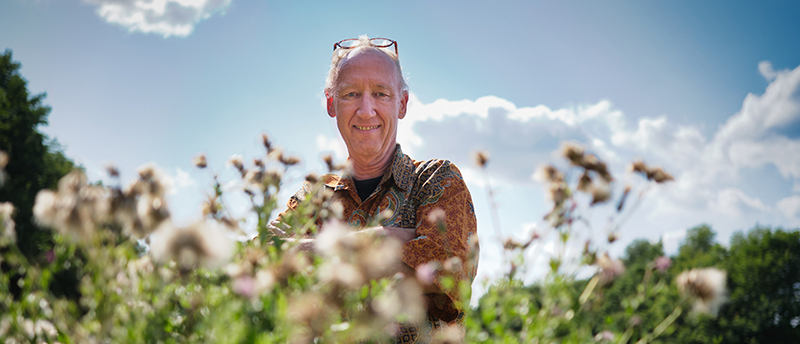 ‘To me, courses in which you spend time out in nature with the students are crucial.’ Photo Guy Ackermans
‘To me, courses in which you spend time out in nature with the students are crucial.’ Photo Guy Ackermans 